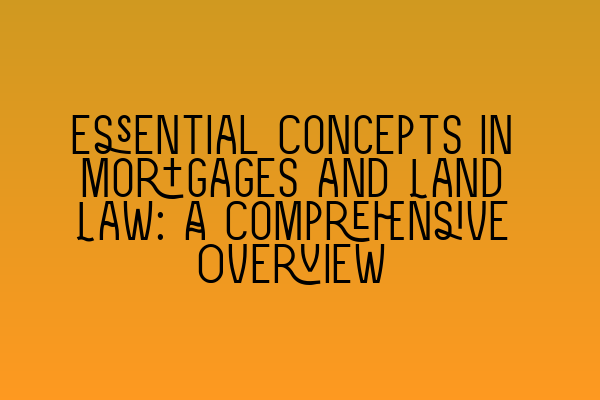Welcome to SQE Property Law & Land Law, your go-to solicitors for all your property and land law needs. In this blog post, we will provide you with a comprehensive overview of essential concepts in mortgages and land law. Whether you are a solicitor looking to refresh your knowledge or a law student preparing for the SQE exams, this article will cover the key points you need to know.
Mortgages
A mortgage is a legal agreement between a borrower and a lender, typically a bank or a financial institution. It provides the borrower with funds to purchase a property while giving the lender a security interest in the property. The borrower repays the loan amount plus interest over a specified period.
Types of Mortgages
There are several types of mortgages, including:
- Repayment Mortgage: The borrower makes regular monthly payments that cover both the interest and the principal amount, gradually reducing the debt over time.
- Interest-Only Mortgage: The borrower only pays the interest on the loan during the mortgage term. The principal amount is repaid at the end of the term.
- Fixed-Rate Mortgage: The interest rate remains fixed for an agreed-upon period, providing stability in monthly repayments.
- Variable-Rate Mortgage: The interest rate changes periodically based on market conditions, leading to fluctuations in monthly repayments.
It is crucial to understand the terms of your mortgage agreement and seek legal advice to ensure you are fully aware of your rights and obligations.
Registration of Mortgages
Mortgages must be registered with the Land Registry to put third parties on notice of the lender’s interest in the property. This registration provides legal protection for the lender, as it establishes priority in case of multiple claims on the property.
Before completing a mortgage transaction, it is essential to conduct a thorough search of the Land Registry to ensure there are no existing charges or encumbrances on the property that could affect the lender’s security.
Legal Remedies for Mortgage Default
If the borrower defaults on their mortgage repayments, the lender has legal remedies to recover the debt. These may include:
- Power of Sale: The lender can sell the property to recover the outstanding debt.
- Foreclosure: In extreme cases, the lender can take possession of the property and sell it to settle the debt.
It is important for both borrowers and lenders to understand these legal remedies and consider them when entering into a mortgage agreement.
Land Law
Land law encompasses a wide range of legal principles and rules that govern the ownership, use, and transfer of land and property. Understanding key concepts in land law is essential for property transactions and disputes.
Types of Ownership
There are two main types of ownership in land law:
- Freehold: The owner has absolute ownership and control over the property and the land it sits on.
- Leasehold: The owner holds a lease for a specific period, subject to certain conditions and restrictions.
When buying or selling a property, it is crucial to determine the type of ownership and assess any associated rights and obligations.
Easements and Covenants
Easements and covenants are legal rights and obligations that affect the use and enjoyment of land. An easement grants a right to use someone else’s land for a specific purpose, such as accessing a neighboring property. A covenant imposes restrictions or obligations on the owner of a property, ensuring certain standards or behaviors are maintained.
Understanding easements and covenants is essential to avoid potential disputes and ensure compliance with legal obligations.
Land Registration
Land registration provides a system for recording and managing ownership rights and interests in land. It helps establish clear and conclusive ownership titles, reducing the risk of fraudulent claims and disputes. In the UK, the Land Registry is responsible for maintaining the land registration system.
Prior to any land transaction, it is crucial to conduct a thorough search of the Land Registry to verify ownership, investigate any restrictions, and assess any potential disputes or encumbrances on the property.
Conclusion
Understanding essential concepts in mortgages and land law is crucial for solicitors, law students, and anyone involved in property transactions. This comprehensive overview has provided an insight into mortgages, registration of mortgages, legal remedies for mortgage default, types of ownership, easements and covenants, and land registration.
If you are preparing for the SQE exams, make sure to check out our related articles on SQE 1 Practice Exam Questions, SQE 1 Practice Mocks FLK1 FLK2, SQE 2 Preparation Courses, SQE 1 Preparation Courses, and SRA SQE Exam Dates. These resources will help you strengthen your knowledge and enhance your chances of success.
At SQE Property Law & Land Law, our expert solicitors are here to assist you with all your property and land law needs. Contact us today to schedule a consultation or learn more about our services.
